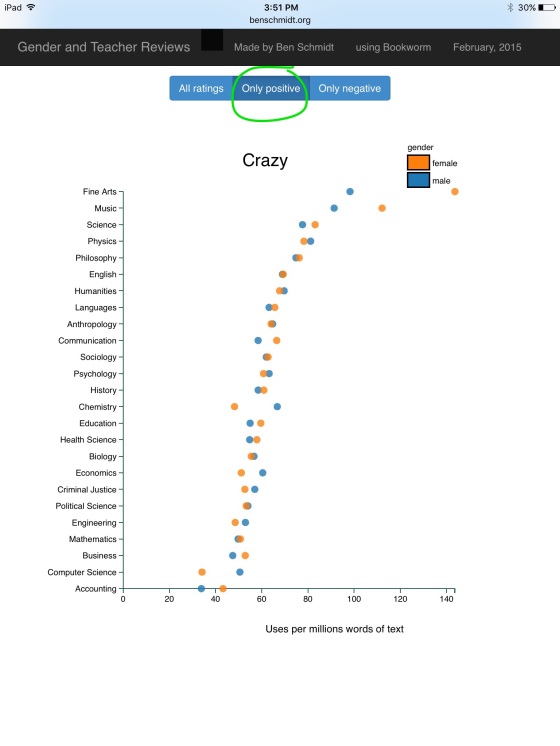Also published at YorkU Women In STEM blog.
In the last few years, we have seen a new wave of awareness and data about the ongoing challenges faced by Women in STEM. Many of the insights about their subtle nature come from peer-reviewed research by colleagues in the social sciences. They deal with diverse topics, ranging from implicit or unconscious bias, to what happens when work is anonymized, and judged, without any knowledge of the author's gender.
Here's a round up of a few of the latest results. Plus, Danica Savonick and Cathy N. Davidson have compiled a comprehensive annotated bibliography of recent research about gender bias in academia.
Visualizing systemic bias against women in STEM (and Academia in General)
Professor Ben Schmidt's interactive data visualization tool illustrates gender-based differences in how students rate their course directors on the popular website, RateMyProfessors.com. You can see the relative frequency with which different descriptive, value-laden words are used, by both both gender and subject area. The results may shock you.
For example, when students use the word "crazy" to describe a course instructor, it is used more frequently for female professors and instructors, and in a negative context. But when "crazy" is used in a positive way -- as in "cool and crazy", then, we see that the spread of the data shifts greatly, and often, it's male profs. that get tagged this way. Though, sometimes, female college instructors are tagged as crazy in a positive way. The variation in use of the word "insane" (positive/negative depending on gender), is even more glaring.
"Insane" usage sums it up nicely, @SDawsonBerlin @SciPubLab @Science_Open @philipbstark HT @benmschmidt #WomenInSTEM pic.twitter.com/wZs1IgWc38
— Dawn Bazely (@dawnbazely) January 8, 2016
We all have unconscious biases: take a test and discover yours
While we may think that it's easy to identify sexism and racism, this isn't always the case. Sure, overt sexism and racism may be glaringly obvious to spot, but what about their more subtle forms?
The socializing effects of being raised in societies, where white males dominate positions of power, have subconscious impacts on how we respond to people at a micro-reaction level. This means that often, our gut-level responses to people aren't based on their actual record of accomplishment, or what they are saying at a particular moment, but in actuality, on our reactions to their gender or colour. And, you won't even know that is happening. Scary, huh?
Find out how much unconscious bias you have by taking one of Harvard University's Project Implicit Association or Bias tests.
Three example of how systemic and unconscious biases play out in real life
There's a ton of research into this, but these 3 studies have stuck in my mind (perhaps because I have directly experienced or observed this kind of thing):
A. In International Relations, a field of Political Science, Maliniak et al. (2013)1 found significant gender differences in citation patterns: men cite women less, and women tend not to cite themselves and their work as much as men do. King et al.2 found a similar trend across all academic fields in a large dataset from JSTOR.
B. Heather Sarsons' research3 found that, in Economics, female professors get less credit for team work and collaborations than do men. Female economics professors going up for tenure are better off publishing alone, rather than collaborating with male colleagues.
C. In a recent study Grunspan et al. (2016)4 found that male Biology undergraduate students were found to be more likely to rate other male students as being knowledgeable about the course content, relative to the actual subject mastery. In contrast, female students were more likely to choose members of either sex, and to base their ratings more closely on actual standing and performance in the course.
Challenging these biases
Learning about imposter syndrome, which happens when people don't think they deserve their success, and fear that they are good enough, is important. Imposter syndrome affects many women in academia, and it also affects men in equal numbers.
The Dunning Kruger effect is, in many ways, the opposite of Imposter Syndrome. It refers to the way that some people rate themselves as being better than their performance actual rates. This is overestimation of one's ability, and studies have found that men tend to overestimate their abilities and performance. In contrast, women underestimate both their abilities and performance.
Understanding how these very subtle effects are playing out in STEM fields and classrooms is an important step in moving towards a more inclusive, diverse STEM community.
Dawn Bazely
1Maliniak, D., Powers, R., and Walter, B.F. 2013. The Gender Citation Gap in International Relations. International Organization. 1-34. doi:10.1017/S0020818313000209
2King, M.M. et al. 2015. Men set their own cites high: Gender and self-citation across fields and over time, Working Paper.
3Sarsons, H. 2015. Gender Differences in Recognition for Group Work, Working Paper.
4Grunspan, D.Z. et al. 2016. Males under-estimate academic performance of their female peers in undergraduate biology classrooms. PLOS One. doi:http://dx.doi.org/10.1371/journal.pone.0148405




